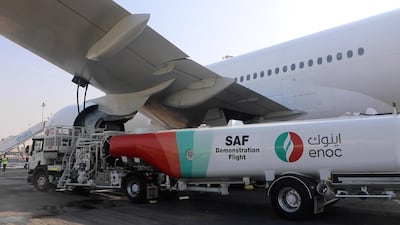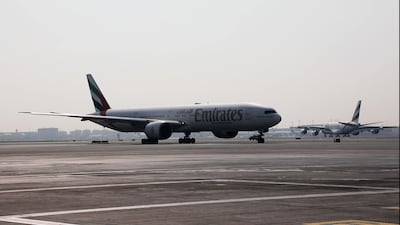Emirates has successfully completed a demonstration flight powered by 100 per cent sustainable aviation fuel (SAF), as part of the global aviation industry's push to use more of the greener fuel to meet carbon emission targets.
The Boeing 777-300ER plane flew for more than an hour over Dubai's coastline on Monday, becoming the first such flight in the Mena region to be powered by SAF in one of two engines, the airline said.
“The trial today is very important and sets a new milestone for the industry and Emirates airline … it has not been done before on a wide body aeroplane, so it is great team work between Emirates, GE and Boeing,” said chief operating officer Adel Al Redha at the Emirates Engineering Centre before the flight took off.
“It is definitely a step forward towards helping the environment. With this step, our aim is to provide an alternative fuel that will reduce carbon emissions and become more environmentally friendly.”
The airline's engineering team is also holding talks with European plane maker Airbus about plans for a similar SAF-powered test flight using its flagship A380 double-decker this year, Mr Al Redha said.
Emirates — the world's largest operator of Boeing 777 and Airbus A380 aircraft — is aiming for “SAF to make up half its total fuel supply by 2030”, although this depends largely on regulatory certification and adequate supply of the alternative fuel at commercially viable prices, he said.
“There is a process we have to go through to get the approval from the regulatory authorities to use SAF on commercial planes,” he said.
“Then we start discussing with the producers how to make this fuel available in Dubai or the UAE in higher quantities and what the delivery costs will be for this fuel.”
The cost of research and development, and production costs for SAF are “high in the beginning”, so the airline is open to working with both local and global companies for its procurement, Mr Al Redha said.
SAF is widely considered in the global aviation industry as the most significant contributor to reaching its net-zero goal by 2050.
However, this requires a major boost in SAF production from the current minuscule levels, and at cheaper prices.
Emirates worked with GE Aerospace, Boeing, Honeywell, Finnish biofuel producer Neste and Wisconsin-based renewable fuels company Virent to procure and develop a blend of SAF that closely replicates the properties of conventional jet fuel.

The initiative adds to the body of industry data and research about SAF blends in higher proportions, paving the way for standardisation and future certification of 100 per cent drop-in SAF as a replacement for jet fuel. The current blend limit is 50 per cent.
“Boeing has been a huge proponent of SAF as the most immediate and long-term method to help the industry reach its target of net zero by 2050,” Kuljit Ghata-Aura, president of Boeing in the Middle East, Turkey and Africa, told reporters.
“SAF is the method by which you can do this with the least disruption to existing infrastructure and existing aircraft design, and is therefore a real credible solution.”
Commercial aircraft are currently allowed to fly using a maximum of 50 per cent blend of SAF combined with conventional jet fuel, and the industry is working towards certification that will permit 100 per cent SAF.
“Boeing Company will only manufacture aircraft that are capable of flying on 100 per cent SAF from 2030,” Mr Ghata-Aura said.
Producing SAF on a cheaper scale will require action from all aerospace stakeholders, including governments, regulators, plane makers, engine makers and airlines, he said.
The use of SAF can result in up to an 80 per cent reduction in the life cycle of carbon dioxide emissions, said Mohamed Al Ghailani, Boeing's regional lead on global sustainability policy and partnerships.
Defining the standards for use of 100 per cent SAF could come within two years, said Zeina Chakhtoura, GE Aviation's senior customer service manager.
Before Emirates' test flight, chemical and physical fuel property measurements were carried out during rigorous trials until a blending ratio that mirrored the qualities of jet fuel was established.
More than 18 tonnes of SAF were blended from renewable diesel fuel provided by Neste and Virent. The 100 per cent SAF supplied one GE90 engine on the Boeing 777 wide-body aircraft, with conventional jet fuel powering the other.
The test flight shows the compatibility of the blended SAF as a safe and reliable fuel source, Emirates said.
The UAE's Enoc Group participated in the test flight by securing, blending and loading the SAF.
Neste said it was working closely together with partners to accelerate the availability and use of SAF as the company increases its SAF production capacity to 1.5 million tonnes per year by the end of the year.
“We look forward to growing the supply of SAF also to Dubai,” said Jonathan Wood, vice president for renewable aviation at Neste's Europe, Middle East and Africa unit.
Virent said its technology converts widely available, plant-based sugars into the compounds that make 100 per cent SAF possible, without the need to blend it with traditional jet fuel.
Working with Emirates on the flight test demonstrates “that we can power sustainable aviation without modifying today’s modern airline engines or the infrastructure that serves the airline industry”, said Dave Kettner, president and general counsel of Virent.



























